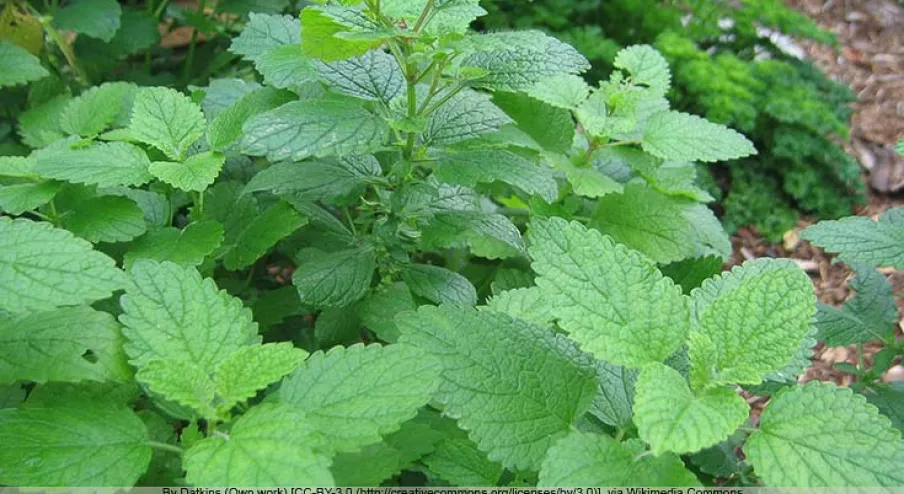Overview
Lemon balm is often used as a natural remedy for stress and sleep issues. It belongs to the mint family known as Lamiaceae. It has been used for centuries to address various health concerns. It offers numerous health benefits, from stress reduction to improved sleep quality. If you are looking for natural ways to relax or elevate your mood, lemon balm might be the perfect choice.
What Is Lemon Balm?
Lemon balm (Melissa officinalis) is a perennial herb to Europe, Asia, and the Mediterranean region. It has lemon-scented leaves which are commonly used in teas, tinctures, oils and as a flavoring agent. In addition to its use as a culinary and medicinal herb, lemon balm is also cultivated as an ornamental plant. Historically, it has been used to address anxiety, insomnia, and digestive issues. Rosmarinic acid, a polyphenolic compound, and flavonoids present in this herb contribute to its therapeutic effects
A 2022 research study focused on the phytochemical composition of lemon balm revealed that the herb contains various compounds such as flavonoids, tannins, phenolic acids, terpenoids, and essential oils.

Health Benefits of Lemon Balm
Lemon balm has been used as a herbal treatment for health issues for over 2000 years dating back to the Greeks and Romans. Here is a breakdown of some of its significant health benefits:
Reduces Anxiety and Stress
Lemon balm is widely recognized for its calming effects. Triterpenes, specifically ursolic acid and oleanolic acid present in lemon balm, are believed to help reduce anxiety. Research indicates that oleanolic acid could help reduce symptoms of anxiety and stress. It works by interacting with the brain’s neurotransmitters, promoting relaxation and enhancing mood. A July 2015 study found that administering 10mg/kg of ursolic acid to mice provided greater anxiolytic effects than diazepam given at 2mg/kg.
Improves Sleep Quality
For individuals struggling with insomnia, inconsistent sleep patterns, or disrupted sleep, lemon balm may provide some relief. It has sedative properties that may calm the nervous system and historically been used as a sleeping aid. Some studies suggest that it can improve sleep duration and quality, especially when combined with other herbs like valerian root. Lemon balm can be used to make nighttime tea that can help improve sleep quality without resorting to pharmaceutical medications.
A 2013 study conducted in Iran found that lemon balm can help reduce symptoms of sleep disorders in menopausal women.
Supports Digestion
Lemon balm can help support digestion and alleviate digestive disorders. It has been traditionally used to relieve symptoms of indigestion, bloating, and nausea. It works by relaxing the muscles in the digestive tract, allowing gas to escape more freely. If gases are not released in a timely manner, they can lead to digestive complications. Consuming lemon balm tea after meals may relieve the uncomfortable sensations associated with indigestion.
Research indicates that rosmarinic acid and various phenolic compounds present in lemon balm can facilitate motility in the gastrointestinal (G.I) tract.
Improves Cognitive Function
Cognitive decline usually accompanies aging, negatively impacting health and quality of life. Lemon balm may boost mental clarity and cognitive ability particularly in individuals dealing with stress or anxiety.. Rosmarinic acid, a polyphenol found in lemon balm and several other plants from the mint family, Lamiaceae, has been discovered to possess neuroprotective properties. Experiments in mice shows that rosmarinic acid may encourage healthy aging by improving cognitive function. Rhodiola Rosea, Lion’s Mane, Ginseng, Peppermint, Ashwagandha, Turmeric, and Sage are some other herbs that may help improve cognitive function.
How to Use Lemon Balm
Lemon balm can be used in various forms. Below are some of the most common ways to use it:
- Lemon Balm Tea: Brewed tea can be used to make a tasty tea. Dip some fresh or dried leaves in hot water for 5-10 minutes.
- Tinctures: These concentrated liquid extract are a convenient way to take lemon balm. Follow the recommended dosage on the product label.
- Essential Oils: Lemon balm essential oil is used in aromatherapy. This essential oil is used traditionally to promote relaxation.
- Capsules: Lemon balm is available in capsule form. This is a convenient option for those who can not drink the tea or tinctures.
Side Effects and Precautions
While lemon balm is generally safe for most people, it should be used in moderation. Some individuals may experience mild side effects like dizziness, nausea, or allergic reaction. Lemon balm may be possibly unsafe for the following groups:
- Pregnant women
- Nursing mothers
- Individuals with thyroid disorders
- Anyone taking sedatives.
Currently, there are no known reports of any side effects from lemon balm when taken as directed for up to 30 days.
Conclusion
Lemon balm as a natural remedy has proven its efficacy over time. With its ability to improve sleep, reduce depression, and support digestion, it is an herb worth considering for anyone looking to improve their overall health. Whether you drink it as tea, take it in capsule form, or use the essential oil, lemon balm can be a simple yet potent addition to your daily routine.
Are you ready to give lemon balm a try? Let it be your natural ally in achieving better relaxation and health. Have you tried it before? Share your thoughts in the comments.
Frequently asked Questions About Lemon Balm
What is the recommended amount of lemon balm to take?
The appropriate dosage depends on the form you are using. Here is a general guide:
- Tea: Dip 1-2 teaspoons of fresh or dried lemon leaves in hot water for about 5-10 minutes.
- Capsules/Tablets: 300-600 mg of lemon balm extract is a common dose for anxiety and sleep issues.
- Tincture: 1-2 ml (about 30-600 drops) is recommended, though it is important to follow specific product instructions.
As with any supplement, it is best to start with a small dose to see how your body responds.
Can Lemon Balm Interact with Medications?
Lemon balm may interact with certain medications. If you are taking sedatives, thyroid medications, or blood thinners, consult your doctor before adding lemon balm to your routine.
Triterpenes present in lemon balm may amplify the effects of sedative drugs, resulting in excessive drowsiness.
Can I Grow Lemon Balm at Home?
Lemon balm is easy to grow in most climates. It prefers sunny spots and well-drained soil. It can be grown in the garden, pots or containers. Lemon balm is an invasive plant that can spread quickly, so you need to be prepared to mange its growth. Fresh lemon balm leaves can be used to make tea or as a culinary herb to add flavor to food.
Can lemon balm be used for skincare?
Lemon balm can be used for skincare. It has soothing and anti-inflammatory qualities that makes it a popular ingredient in skincare products. It can help calm irritated skin and potentially reduce redness and swelling. Lemon balm essential oil can be diluted and applied to the skin, but it is essential to perform a patch test first to check for an allergic reactions.
Can lemon balm be used with other herbs?
Lemon balm can be mixed with other herbs without causing any harm to the body. It blends well with other calming herbs like chamomile, lavender, and valerian root. These combinations are often used in herbal teas to promote relaxation, reduce anxiety, and improve sleep quality.
How quickly does lemon balm work for sleep and anxiety?
The soothing effects of lemon balm can typically be felt within 30 minutes after consumption, especially when taken in tea form. For optimal results related to sleep and anxiety, it is best to consume the herb consistently over a few days to experience its full benefits.
Is lemon balm safe for children?
Lemon balm is generally safe for children in small quantities, such as in tea or as part of a recipe. Nonetheless, it is important to consult a pediatrician before giving it to young children, especially in concentrated forms like tinctures.
What is the best way to store lemon balm?
Fresh lemon balm can be stored in the refrigerator for up to a week. The leaves can be dried by hanging them upside down in a cool, dry place, then store them in in airtight container for several months. Alternatively, lemon balm leaves can be frozen for longer storage.





